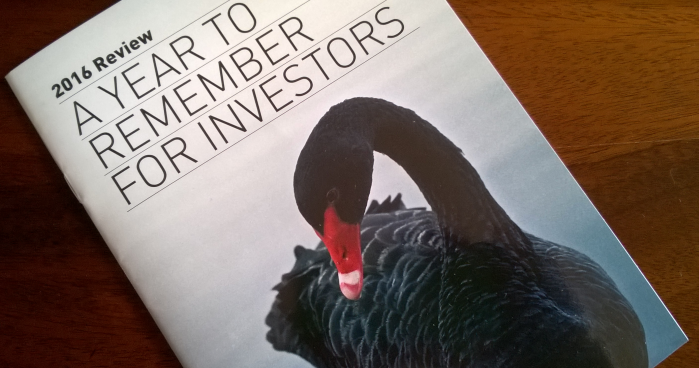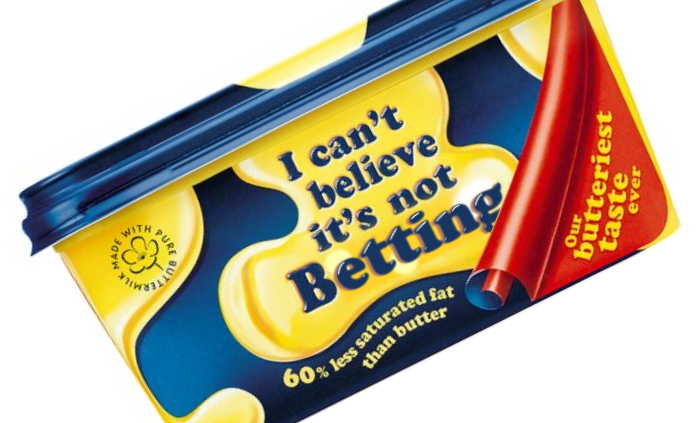Address
39 Fen End Lane.
Spalding, Lincs. PE12 6AD.
Not a black swan

One professional adviser publication produced a review of the year with a picture of a black swan on the front. It’s a clear reference to the results of the UK referendum and US election. Except they weren’t black swan events. ‘Black swans’ are outcomes that, to the majority, are completely unexpected.
There’s little point in me adding to the terabytes of pixels trying to explain any permutation of voter preferences or special interest groups that may have swung either the Brexit vote or US election 2% the other way. But events where even a 10% swing can change the outcomes aren’t black swans.
Those on the losing side of either vote may feel aggrieved and a little shocked, but that doesn’t mean the results were unimaginable or even unlikely. In two horse races the five to one shot can win, especially if the basis of measuring those odds via polls is particularly difficult in the first place. The main weight of money being wagered was also centered in London or New York.
Polls apart – different polling techniques
On the subject of polls, I’d like to draw your attention to this blog, UK Polling Report. It’s written by YouGov’s Anthony Wells and he gives a frank analysis of the forecasting problems the industry has faced since the surprise result of the 2015 general election. And this year, the size of the adjustments that some polling companies were making to their traditional polling data to make their results more representative of the overall population were a warning sign in themselves.
Anthony also does a good job of explaining the limitations of internet ‘voodoo’ polls. These are loved by the mainstream and local media when they match their editorial message or support a headline grabbing story. But as a method of collating the views of a population they are very flawed.
Valuations Top Trump
The implications of the Brexit vote and US election are important, but to me they are still trumped by the extreme level of bond and equity valuations. And they remain high even as the US attempts to begin returning interest rates to more normal levels.
All the talk is of better economic numbers and economic impetus from Team Trump. But the change in rates has implications for all the debt built up on the journey to negative interest rates reached in the summer in many places in the world. At the moment that seems to have been forgotten by investors, but you can read about it here and here.
Central banks will be mindful of that and will continue to try to manage interest rates at artificially low levels. The result is that the main escape valve for economic stress is still through adjustments in exchange rates.
We have seen this several times since I wrote this blog almost two years ago.
You could be forgiven for thinking little has changed in the meantime. The FTSE index is back above 7000 after a trip to 5500, mortgage rates are similar and West Ham are still losing at home to Arsenal. But, foreign exchange rates have changed significantly and it’s not all about the pound. Expect more of the same and, above all, keep your investments simple and don’t chase after yield. This is especially true if it’s wrapped in a product you’re not sure about.
Spread trading – I can’t believe its not betting

At the end of that blog I also pointed out the dangers of trading foreign exchange using spread betting companies and expecting to win. Some firms are more reputable than others. But, if you were leveraged at the ratios encouraged by some of the these firms, the natural volatility in the market place would likely cause you losses. And that is before you even consider the large structural moves that have happened.
Back then I wrote:
‘If you are tempted by the hype, just ask the company seeking your business what percentage of their customers make money over a year? That should focus your mind a bit.
Well, early in December, the FCA finally announced plans for a crackdown on the amount of leverage that spread betting firms can offer to the trading public. In the consultation document it even included a suggestion that there should be mandatory disclosures on the ratio of winning/losing positions.
I don’t know why it has taken them so long to get to this point, but at least they are getting there. Although something tells me they are going to be more preoccupied with the peer to peer marketplace over the next year or two.
I’ll be looking at that sector again in the near term now that there are some signs of possible discomfort.
Complex investments are, well, complex.
It’s been a couple of months since I wrote my last blog, but I haven’t been quiet at work – far from it.
On behalf of other financial advisers in our group I’ve been taking a much closer look at what we term ‘complex investments’. These include structured products that offer a variable profit or loss if the underlying investment reaches certain levels over time, but also those investments that offer large tax incentives to encourage investment in smaller companies. (Examples are venture capital trusts (VCT), enterprise investment schemes (EIS & SEIS) and newer schemes that offer social investment tax relief (SITR).)
And what I’ve found is that some complex investments can be too complicated for a financial adviser to reasonably assess given a limited amount of time. There can be a layer of risk that isn’t obvious in a promotional document or even in the risk assessment of an independent research firm.
Or we may simply not have all the data we’d like. It’s painfully difficult to get historical information about previous performance from some scheme providers. They tell me that the data is proprietary information.
Well, it might be, but I believe I’ve found a way of getting the data I require in any event. And it’s producing some unexpected results.
I’ll be writing more on this topic in the new year.
Best wishes for a Happy New Year!
Please remember:
- past performance is no guide or guarantee of future returns;
- the value of stock market investments can rise and fall over time, so it is quite possible to get back less than what you put in, depending upon timing;
- this blog does not constitute financial advice and is provided for general information purposes only.